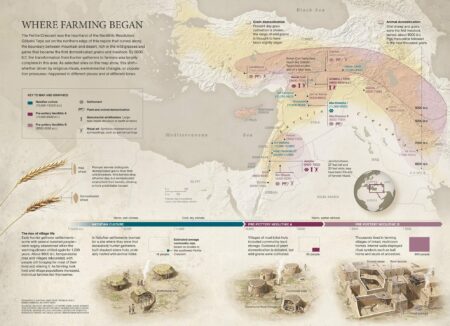Yeah, ok, here’s that cool map about the Fertile Crescent that I alluded to in a recent Nibble.
But do read the blog posts by Chad Mulligan the thesis of Graeber and Wengrow’s The Dawn of Everything with regards to the origins of farming Part 1 and Part 2.
In chapters six and seven of The Dawn of Everything, David Graeber and David Wengrow present a very different account of the origins of agriculture than that found most conventional history books. This account, they say, contradicts many of the assumptions made by the authors of Big History, who tend to portray farming as ineluctably leading to inequality, hierarchy, private property, violence, and centralized states.
Instead, they argue that early farming societies were no more hierarchical than their predecessors, and may have even been less violent more egalitarian than their hunter-gatherer neighbors. The imply that cultivation may have even initially began as a strategy expressly designed to avoid succumbing to the values of hierarchy and violence. They are especially critical of Yuval Noah Harari’s Russian reversal-style metaphor of “wheat domesticating us.” This, they say, is yet another “Garden of Eden-type narrative,” except with “wheat taking the place of the snake.”
